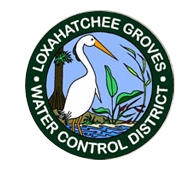The Loxahatchee Groves Water Control District Board of Supervisors approved motions Monday to move forward with bills to send to the state legislature that would make its roads public rights of way, thereby enabling it to transfer them to town ownership.
The proposed enabling legislation was discussed Oct. 22 at a Town of Loxahatchee Groves workshop, where it was agreed that two proposed bills will be forwarded to the local legislative delegation, one to address the balance of all district roads providing for the dedication of road right-of-way easements to the public, and the other to provide for the dedication of public access to the district’s rights-of-way for equestrian purposes.
LGWCD Administrator Stephen Yohe said that subsequent to the district’s Oct. 14 board meeting, it was determined that lobbying service from Ramba Law Group for the second bill would cost an additional $10,000. The Loxahatchee Groves Town Council met on Nov. 5 and approved equal cost sharing for Ramba Law Group services for the first bill and approved moving forward with the second bill, but did not address funding the service.
The delegation hearing is Dec. 19, and the deadline for filing local bills is Nov. 29.
Yohe asked the board to approve motions to approve the district’s cost share for the Ramba Law Group, proceed with the first bill, and to direct staff to fully finance services for the second bill.
Supervisor Frank Schiola made a motion to approve the cost share for the first bill. Supervisor John Ryan seconded the motion, asking that the district’s share be paid out of the $150,000 funding for road maintenance that had been paid to the district by the town. The motion carried 3-0, with Chairman Dave DeMarois and Supervisor Don Widing absent.
Ryan made a motion for legal staff to draft a resolution to go forward with the first bill, which would be similar to previous enabling legislation when it transferred sections of lettered roads to the town that it had paved, which no longer needed grading and watering provided by the district. The town also has greater authority to enact and enforce traffic controls on the roads.
The bill states that when a road within the district has been constructed by the district and been maintained or repaired continuously and uninterruptedly for seven years by the district, for right-of-way purposes, it shall be deemed to be dedicated to the public, whether or not the road has been formally established as a public road.
The motion carried 3-0.
Ryan also made a motion to direct staff to work with the town to fully fund Ramba Law Group services for the second bill transferring ownership of district rights of way to the town for equestrian trail rights of way.
Schiola said the second bill benefits both the district and the town. “It makes it a lot easier for the town to get grants for the trails and to take our easements and make them into trails,” he said. “I’m all for that.”
During public comment, resident Virginia Standish said she was disappointed that the district saw the need to separate the road and equestrian easements into two separate bills. “I’m not sure what the quandary is to put these two bills together,” Standish said. “I think it’s an insult to landowners. I also think it’s a huge waste of taxpayers’ and landowners’ money unless you’re simply trying to pad the bill for the law firm.”
Councilman Jim Rockett said the council had discussed the second bill at a meeting with the presumption that the lobbying cost would be minimal, since it would follow a similar track as the first bill, although this would be its first time through the process.
Ryan, who had helped guide the initial enabling legislation transferring paved portions of the letter roads to approval, said the two bills would be approached very differently.
“The first bill has a precedent,” Ryan said. “It also has a directly applicable Florida Statute. The work with the legislative drafting committees and the work with the legislators themselves including our local delegation will be one directed effort at bill number one, and bill number two is being approached separately, even though they will probably have an identical sponsor, but they will have different hearings and perhaps even different jurisdictions. That’s the reason for allowing an incremental expense associated with bill number two.”
Ryan said the council had discussed the two bills and that the second bill would be significantly different from the first bill.
“The idea was that the district and the town have multiple reasons to see that bill number one goes through as smoothly as possible, and that both groups are committed to making a full effort to get bill number two through, but it will be approached differently since it has no precedents or Florida Statute associated with it,” Ryan said.
That motion also carried 3-0.








